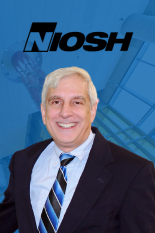Lex Schultheis Named a Winner of the NIOSH Respirator Fit Evaluation Challenge
Fischell Institute Foundry member Lex Schultheis has been selected as one of the winners for the first phase of the National Institute for Occupational Safety and Health's (NIOSH) Respirator Fit Evaluation Challenge. The challenge is a three-phase, $350,000 competition to improve respirator fit evaluation. For the challenge, Schultheis submitted a face-to-fit method to measure leakage in disposable respirators by optical gas imaging, detect gas leakage during physical activity by colorimetric methods, and evaluation of a biocompatible adhesive barrier strip on anatomy prone to leakage. Schultheis and the Fischell Institute engineers collaborated with the Department of Anesthesiology at the Uniformed Services University School of Health Sciences for the project. The Fischell Institute and the Department of Anesthesiology worked extensively during the COVID-19 pandemic to improve personal protective equipment (PPE) airway testing and engineer solutions during PPE shortages. They have noted ongoing needs to facilitate the immediate detection of respirator leakage, identified users who develop respirator leakage during a workday, and meet the needs of critical personnel for whom commercial disposable respirators do not fit. "We recognize that there is a serious gap in the U.S. manufacturing capacity of NIOSH-compliant respirators," explained Arlene J. Hudson, Associate Professor and Chair of the Department of Anesthesiology, in a letter of support. "Moreover, there are no commercially available face-fitting respirators that meet NIOSH standards for all anthropomorphic facial profiles." Schultheis was inspired by an essential lesson from the COVID pandemic: specific disposable masks, called respirators, work better than others and have performance verified by the National Institute of Safety and Health. "Respirators catch the smallest airborne droplets that can penetrate the deep areas of the lungs. However, no mask is effective if air leaks around the filter to be inhaled or if air from an infected person is exhaled around the filter, exposing others," explained Schultheis. Schultheis stated that the tests to assess leakage around a respirator approved by the Occupational Safety and Health Administration are cumbersome because they require a specialized laboratory. To correct this problem, the Fischell Institute has proposed a test involving a camera that measures gas movement. The camera is handheld, so the device can be taken anywhere and be used quickly on large numbers of people. Another problem with respirators/masks is leakage around filter material that can occur when worn during physical activity. The Fischell Institute is evaluating the use of chemical indicators built into the respirator that immediately reveals a new leak around its border where it makes contact with the face. This way, a person wearing the respirator would know to replace it when the filter becomes damaged or worn out. "I look forward to working with the Fischell Institute and collaborators to help improve our ability to fight pandemics like COVID-19," said Schultheis.
Related Articles: August 3, 2023 Prev Next |


